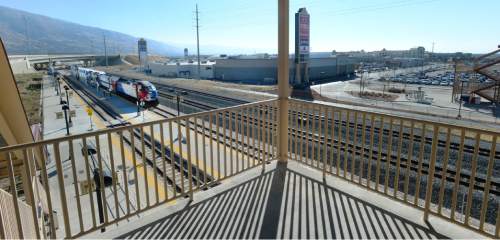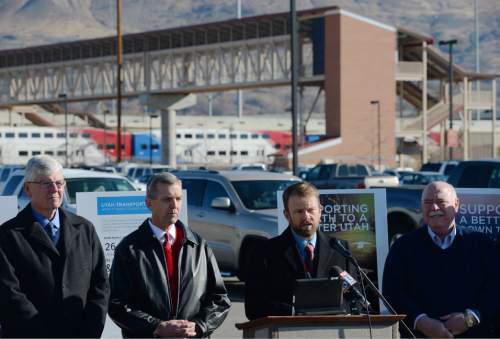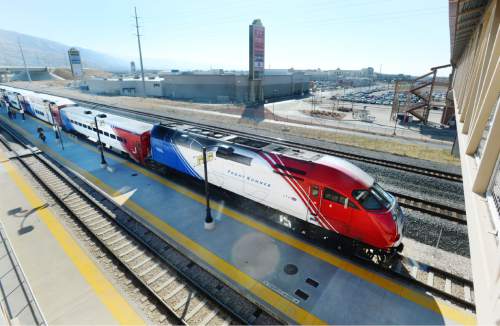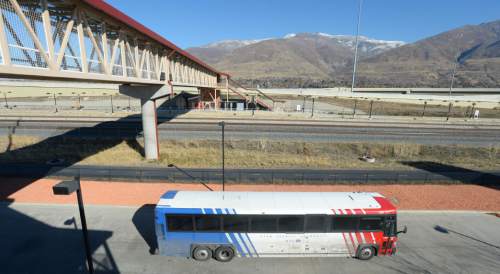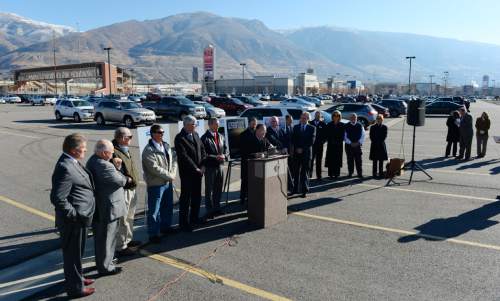This is an archived article that was published on sltrib.com in 2014, and information in the article may be outdated. It is provided only for personal research purposes and may not be reprinted.
Farmington • Cities, counties and businesses statewide joined forces Monday to launch a drive to increase transportation funding in the upcoming Legislature.
"We're here today to launch a statewide public education campaign talking about the need for increased transportation investment," said David Golden, a Wells Fargo vice president who chairs the Salt Lake Chamber's Utah Transportation Coalition.
He was surrounded by a group of mayors and county commissioners from around the state at Farmington's Station Park, a thriving commercial development next to a FrontRunner station, Interstate 15 and Legacy Parkway — which they said shows transportation spending fosters other investment.
The group also had pushed for increases in this year's legislative session — but failed in an election year to pass bills that would have allowed local sales tax hikes for mass transit and changed the gasoline tax to raise money for state and local highways.
But 2015 is not an election year for legislators, and tax hikes may have a greater chance of success.
Rep. Johnny Anderson, R-Taylorsville, co-chairman of the Transportation Interim Committee, said the panel will hear pitches at a hearing Wednesday from the group about transportation needs and funding options.
Then the committee plans a two-day retreat in early December in Vernal to discuss possible tax hikes or other changes before the Legislature convenes in January.
Among options up for discussion, Anderson said, is increasing the state gasoline tax — which has been unchanged since 1997 — or converting it from a per-gallon charge to a percentage sales tax that could increase revenues if the price of gas increases (or drop when it decreases).
Other options include allowing local cities or counties to add sales tax on gasoline in their areas to generate money for their local roads, he said.
Because some alternative-fuel cars now escape gasoline tax — and because revenues are falling as mileage in almost all cars is improving — Anderson said there will also be discussion of possibly tying registration fees to overall vehicle miles traveled.
Lawmakers also will consider proposals to allow local counties to raise sales tax for transit up to 1 cent per $1 in sales. Currently, such taxes are .69 cents per $1 in Salt Lake County. Davis, Utah, Weber and Box Elder county residents pay .55 cents, and Tooele pays .3 cents.
"In order for local communities to raise taxes for local transit, we as legislators have to increase the cap" in state law, Anderson said.
The state's Unified Transportation Plan recently identified $54.7 billion in critical road and mass transit projects needed through 2040. A later study by the Utah Foundation said current taxes would fall $11.3 billion short of covering the critical projects.
A study by the Salt Lake Chamber last year said funding that shortfall would bring $20 billion in economic growth, and create 183,000 jobs through 2040.
"As we invest in infrastructure, our economy grows," Sen. Stuart Adams, R-Layton, said at the news conference. He said such investment creates an economic engine that could bring more taxes to benefit such things as schools — which would be a main competitor with transportation for any increased revenue.
"As we keep our economy going, we'll have money to fund a lot of different things," Adams said.
Golden, the banking executive, added, "The exceptional economic success of our state is to a significant degree attributable to this [transportation] investment, and proof that continued investment will pay off in the future."
"Delaying transportation investments will cost taxpayers more in the long run," said Davis County Commissioner Bret Millburn, urging quick action. Maintaining roads is cheaper than letting them deteriorate, forcing more costly rebuilding.
The state's population is expected to nearly double by 2050. "To accommodate this growth," Millburn said, "we need to preserve our existing infrastructure and conservatively address priority capital needs."
Provo Mayor John Curtis said, "A reliable, effective and well-maintained transportation system is not only an important part of the quality of life of our residents, it is an expectation."


